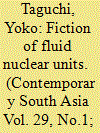| Srl | Item |
| 1 |
ID:
108325


|
|
|
|
|
| Publication |
2011.
|
| Summary/Abstract |
This article explores mobility transitions in Thailand through the particular experience of two villages in Northeast Thailand over the period from the early 1980s through to 2009. The authors show through the mobility histories of Ban Non Tae and Ban Tha Song Korn that, while rural settlements may have always had a greater degree of mobility than the sedentary peasant paradigm suggests, important changes have taken place over the last quarter of a century in how that mobility is manifested. Personal mobility has increased; the migration of women has become as prevalent as that of men; and a mixture of daily commuting and more permanent moves have replaced seasonal circulation. In the process, mobility has created complex, multi-sited households; has led to a growing geriatrification of farming; and has altered the basis for livelihood sustainability and village resilience. Case studies of two individuals highlight these dynamics and add color to the themes the authors present. In making clear households' changing spatial signatures, the authors also seek to show how national and international development processes are imprinted in village and household histories.
|
|
|
|
|
|
|
|
|
|
|
|
|
|
|
|
| 2 |
ID:
178517


|
|
|
|
|
| Summary/Abstract |
Fictions that account for nature-culture have always been crucial for the anthropology of kinship, but the significance of fiction has increased through the extension of new technologies and global transactions. This paper examines the dynamics of householding relations in Mumbai through the lens of fiction. A contemporary middle-class household in India is a rich field of study, as it is filled with the memories of family retailers, the responsibilities and expectations of family members as well as of domestic workers and their families, and the uncertain relations of everyday life. As recent literature on domestic work and servitude suggests, these complex relations also reflect historical inequalities. By focusing on paid domestic work, this paper not only examines external inequalities but inquires into the generation and potential transformation of households and of kinship itself. It then illustrates how domestic work with entangled social imaginaries creates a new image of family, one which does not simply reflect a shift from the feudal to the modern, or from joint family to nuclear family, but rearticulates relations by evoking various fictions.
|
|
|
|
|
|
|
|
|
|
|
|
|
|
|
|